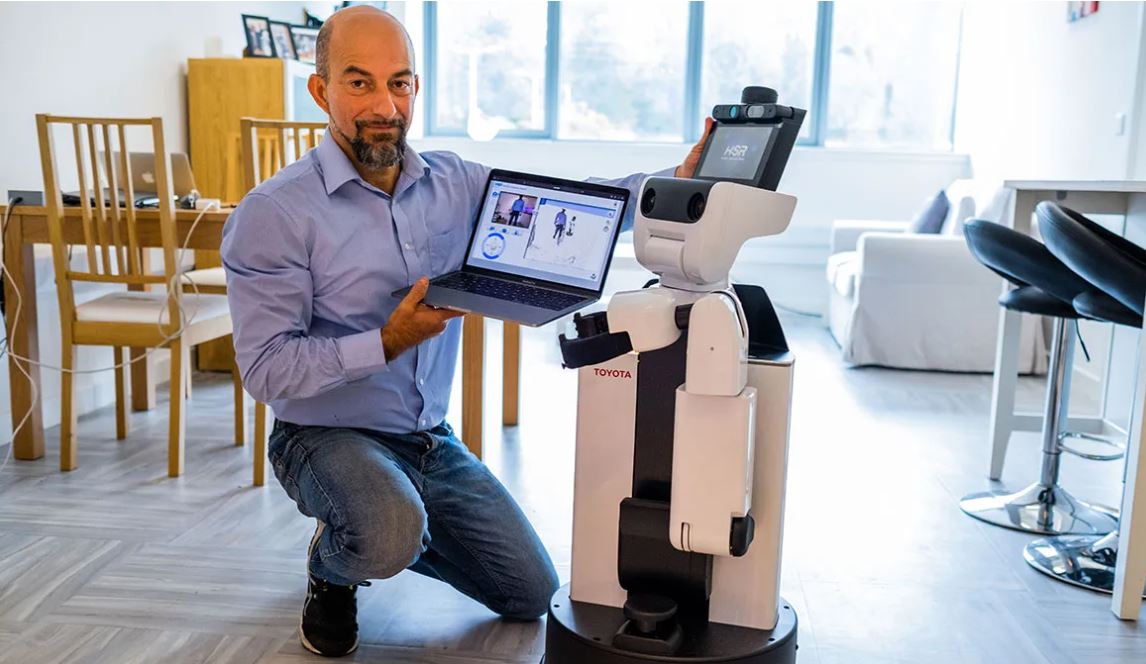Published:

For many years, research has taken place to create robots that can provide better support to vulnerable people and their carers. However, more often than not, inventions have gone unadopted. To ensure the acceptance and adoption of robotics, it is clear that collaboration between research and industry must take place. The importance of this partnership has been outlined by Colin Foskett of Blackwood Homes & Care.
Writing in AT Today, Colin Foskett discussed how his company is benefitting from collaborating with Heriot-Watt's academics from the National Robotarium to develop technologies which can support independent living.
He discussed how the collaboration with the National Robotarium, the world-leading robotics and AI research facility delivered in partnership by Heriot-Watt University and the University of Edinburgh, is being hugely valuable in spotting innovation opportunities to integrate with their digital housing and care system CleverCogs™. This is Backwood's digital system which keeps carers connected, helps patients become more independent and lessens the need for carers to sleep over, giving them peace of mind that technology is ensuring the wellbeing of residents.
Co-creation
When adapting this project to practical uses, the team faced technical challenges. The product is delivered through a secure two-way video call. However, in the case of an emergency, the team needed better solutions to make sure that responders were able to assess the situation quickly.
Drawing knowledge and insights from the OpenAAL project, meant that the team is now exploring the use of tele-presence robots, i.e. robots that emergency responders can control, over the Internet, as a way to bring a video-call to each room. This avoids the need to install cameras in every room, which would pose issues of privacy and feasibility. It also provides new ways for professional carers and family members to keep in touch with their loved ones.
The OpenAAL project, led by the CARE research group at Heriot-Watt University, has connected the National Robotarium with a wide network of health and social care providers. It also set the foundations of an open and remote access living lab targeting the fast co-creation of socially acceptable, scalable and affordable solutions to support the care of vulnerable people. The facility is being used to run workshops that explore users' requirements and concerns, and to enable robot developers to program and monitor assistive robots over the Internet. As such, OpenAAL provides a platform that end users, researchers, and technology providers all over the world can use to co-create assistive products, exploiting emerging robotic and artificial intelligence technology.
Dr Mauro Dragone, the National Robotarium academic who is overseeing the collaboration with Blackwood Homes and principal investigator of OpenAAL said, “The collaboration with Blackwood contributes to defining research priorities and questions for health and social care robotics. Working with people who have experience in developing products with practical uses and including end-users in the design of the innovation is key to surmounting barriers, whilst allowing ideas to move from the laboratory into real-life settings. This will accelerate development of practical and affordable robotic solutions. It will also ensure that the developed tools relate to our social and ethical moral constructs and values and can fully integrate with emerging health and social care services.”
Help de-risk investment
The National Robotarium offers spaces called ‘living labs' where robotics and technology-driven solutions are tested in real life situations, often involving end-users and decreasing the risk of investment in new technologies.
Industry leaders and academic collaboration provides an efficient and sustainable way to de-risk investments. Not only does it decrease the risk of faulty technology designs by drawing on the expertise of academics, but the researchers play a central role in developing facilities where products can be tested before they are rolled out with users.
Looking to the future
Following its collaboration with the National Robotarium, Blackwood Homes now aims to integrate robotics as a central aspect of its business strategy. The project showcases the positive impact that long-term partnerships between universities and health and social care providers can have. Working with academics is a vital way to develop new technologies that are designed with and for people working in the care sector.
It is hoped that these technologies will enhance quality of life for end-users by providing them with the support they need and, more importantly, by allowing them to gain greater independence. As such, academia has a central role to play in the future of the care sector to contribute knowledge, support and expertise.